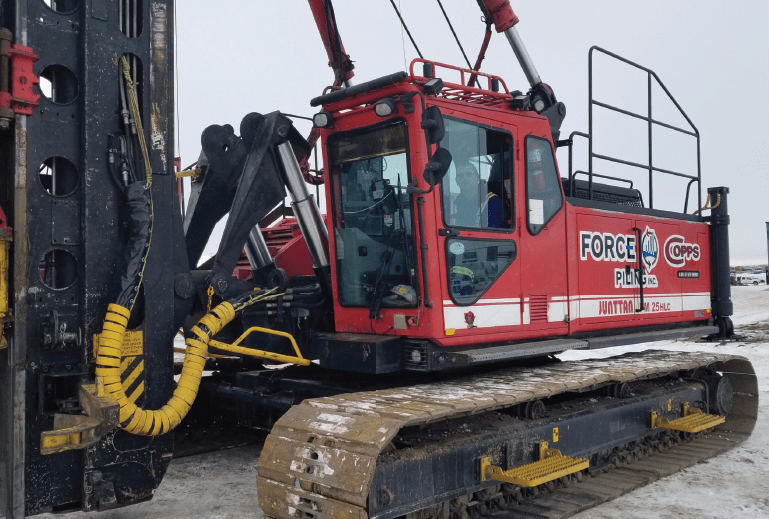
Rory Brown fixed cars for almost three decades before he decided to change careers and get into the pile driving business.
“I was an autobody technician. We lived back in Nova Scotia which was where I had done the automotive thing for quite some time, probably close to 30 years,” said Brown, who moved from the Halifax area to Calgary, Alta., with his wife, Christina, seven years ago.
“I did that work for a little bit when we moved to Alberta, but then a friend of mine who was in the piling business told me his company was looking for ground workers and he asked if I’d be interested in going up north and doing camp work for them,” Brown said. “I thought, ‘Why not?’”
Brown started his first piling job in 2012 as an operator’s assistant for Red Deer, Alta.-based Copps Services Inc. during construction of a Nexen Energy facility near Fort McMurray, Alta. Junttan rigs performed the piling work, and it was the first time Brown had ever actually seen a Junttan machine.
“It’s a big piece of equipment for sure, and not knowing anything about it, it was definitely a bit intimidating,” he said. Brown notes it wasn’t long before he was given the opportunity to learn how to operate a Junttan rig himself. “You learn the ground game and how the whole process works, and then hopefully if you do well at those tasks, they’ll train you in a machine,” Brown said.
“The transition was pretty smooth. You have a couple of lumps and bumps along the way… and as long as nobody’s hurt and everything’s ok, hopefully you learn from it and move on.”
Brown is now qualified to operate four Junttan machines — the PM16, PMx20, PMx22 and PM25 — and has experience with numerous piling applications which include round steel piles, sheet piles and H-piles as well as soldier piles for lagging. He’s also installed sheet and H-piles with an ABI Equipment TM 22 Mobileram piling rig.
Brown has his sights set on learning how to operate another Junttan machine — the PM23. “I’ve had a little bit of time in it. The configuration is different, and it has a lot longer reach,” he said. “It’s a little different rig, and I’d like to get some training on that.”
Easier on the Body
Brown, 55, said, “The automotive business can be a little hard on the body,” and it’s one of the reasons he opted to make the switch to piling rig operator, “It’s a little easier on me.” Brown also enjoys the comradery among pile driving crews as well as the satisfaction of seeing a job successfully completed. He also welcomes the variety that comes with pile driving work. “Every job is different and you’re in a different location quite often,” Brown said.
Brown spent nearly six years with Copps Services, working primarily on projects for the oil and gas industry in Alberta and Saskatchewan, but doing some civil construction work as well. One of these jobs involved erecting apartment buildings in New York City.
“The New York project was very interesting to me,” Brown said. “We were building these massive high rises right on the East River in Brooklyn. All the piles had to go in so deep, right down to bedrock, and it was different style of piling for me as far as how much capacity you had to put down to make that happen.”
In 2018, Brown did some contract work for South Carolina-based Pile Drivers Inc., installing timber piles for housing projects in and around the Charleston area of South Carolina before joining Force-Copps Piling Inc. (a new firm established with the merger of Copps Services and Force Pile & Foundations) last October. Brown has also been involved in training pile driving crews and he believes one of the strongest attributes a piling rig operator can have is keeping an open mind.
“It’s impossible to know everything. You’re always going to learn something every day and you shouldn’t think you know it all,” he said. “You have to be open to new ideas, especially with the safety aspect of it.
“That’s a big piece of equipment and you’re hoisting some pretty heavy loads,” Brown said. “The biggest thing is what goes on around you. You have to be looking out for the guys on the ground and always watching for obstructions or obstacles, so that you’re not damaging equipment or putting people at risk. You have to be very mindful of that.”
Brown says he’s optimistic about the future of the piling industry and is encouraged that hydraulic hammers are taking the place of diesel hammers on many job sites these days. “Diesel hammers are going away because of the environmental impact they have,” he said. “I think that’s a move in the right direction.”